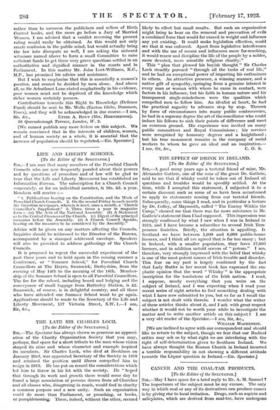THE LATE SIR CHARLES LOCH.
[To the Editor of the SPECTATOR.] Snt,—The Spectator has always shown so generous an appreci- ation of the Charity Organization Society that you may, perhaps, find space for a short tribute to the man whose vision shaped its aims and whose character and example inspired its members. Sir Charles Loch, who died at Bookham on January 23rd, was appointed Secretary of the Society in 1876 and retained the position until illness compelled him to resign in 1913. He has put on record the considerations which led him to throw in his lot with the society. He " hoped that through its work and growth there would some day be found a large association of persons drawn from all Churches and all classes who, disagreeing in much, would find in charity a common purpose and a new unity. Such an organization could do more than Parliament, or preaching, or books, or pamphleteering. These, indeed, without the other, seemed likely to effect but small results. But such an organization might bring to bear on the removal and prevention of evils a combined force that would far exceed in weight and influence any yet existing. It could make legislation effective, could see that it was enforced. Apart from legislative interference and with the use of means and influences more far-reaching, it would renew and discipline the life of the people by a nobler, more devoted, more scientific religious charity."
This " plan that pleased his boyish thought " Sir Charles Loch steadily pursued " through all the tasks of real life," and he had an exceptional power of imparting his enthusiasm to others. An attractive presence, a winning manner, and a native gift of sympathy, springing from a genuine interest in every man or woman with whom he came in contact, were factors in his influence, but his faith in human nature and his transparent single-mindedness were the qualities which compelled men to follow him. An idealist at heart, he had the practical sagacity to advance step by step. Thrown by force of circumstances into many public controversies, he bad in a supreme degree the art of the conciliator who could induce his fellows to sink their points of difference and meet on common ground. His experience was invited on many public committees and Royal Commissions ; his services were recognized by honorary degrees and a knighthood ; but his true monument remains in the company of social workers to whom he gave an ideal and an inspiration.—










































 Previous page
Previous page